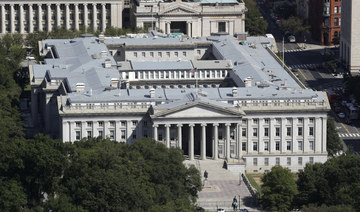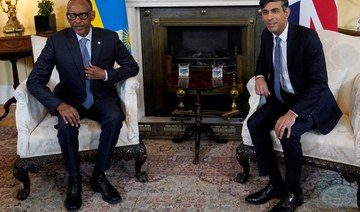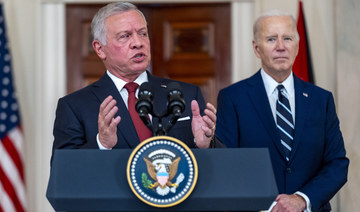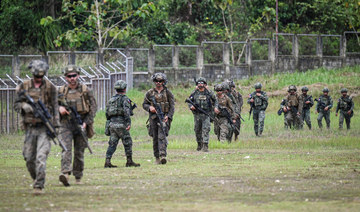WASHINGTON: Federal authorities expressed increased alarm Thursday about a long-undetected intrusion into US and other computer systems around the globe that officials suspect was carried out by Russian hackers. The nation’s cybersecurity agency warned of a “grave” risk to government and private networks.
The hack compromised federal agencies and “critical infrastructure” in a sophisticated attack that was hard to detect and will be difficult to undo, the Cybersecurity and Infrastructure Security Agency said in an unusual warning message. The Department of Energy acknowledged it was among those that had been hacked.
The attack, if authorities can prove it was carried out by Russia as experts believe, creates a fresh foreign policy problem for President Donald Trump in his final days in office.
Trump, whose administration has been criticized for eliminating a White House cybersecurity adviser and downplaying Russian interference in the 2016 presidential election, has made no public statements about the breach.
President-elect Joe Biden, who will inherit the potentially difficult US-Russia relationship, spoke up forcefully about the hack, declaring that he and Vice President-elect Kamala Harris “will make dealing with this breach a top priority from the moment we take office.”
“We need to disrupt and deter our adversaries from undertaking significant cyberattacks in the first place,” he said. “We will do that by, among other things, imposing substantial costs on those responsible for such malicious attacks, including in coordination with our allies and partners.”
“There’s a lot we don’t yet know, but what we do know is a matter of great concern,” Biden said. He thanked administration “public servants” who he said were “working around-the-clock to respond to this attack.”
CISA officials did not respond to questions and so it was unclear what the agency meant by a “grave threat” or by “critical infrastructure” possibly targeted in the attack that the agency previously said appeared to have begun last March. Homeland Security, the agency’s parent department, defines such infrastructure as any “vital” assets to the US or its economy, a broad category that could include power plants and financial institutions.
The agency previously said the perpetrators had used network management software from Texas-based SolarWinds to infiltrate computer networks. Its new alert said the attackers may have used other methods, as well.
Tech giant Microsoft, which has helped respond to the breach, revealed late Thursday that it’s been working to notify more than 40 organizations that were compromised using “additional and sophisticated measures” beyond the back door into SolarWinds systems. Microsoft said most of the compromised customers are in the United States, with victims also in Canada, Mexico, Belgium, Spain, the United Kingdom, Israel and the United Arab Emirates.
Over the weekend, amid reports that the Treasury and Commerce departments were breached, CISA directed all civilian agencies of the federal government to remove SolarWinds from their servers. The cybersecurity agencies of Britain and Ireland issued similar alerts.
A US official previously told The Associated Press that Russia-based hackers were suspected, but neither CISA nor the FBI has publicly said who is believed to be responsible. Asked whether Russia was behind the attack, the official said: “We believe so. We haven’t said that publicly yet because it isn’t 100% confirmed.”
Another US official, speaking Thursday on condition of anonymity to discuss a matter that is under investigation, said the hack was severe and extremely damaging although the administration was not yet ready to publicly blame anyone for it.
“This is looking like it’s the worst hacking case in the history of America,” the official said. “They got into everything.”
At the Department of Energy, the initial investigation revealed that malware injected into its networks via a SolarWinds update has been found only on its business networks and has not affected national security operations, including the agency that manages the nation’s nuclear weapons stockpile, according to its statement. It said vulnerable software was disconnected from the DOE network to reduce any risk.
The intentions of the perpetrators appear to be espionage and gathering information rather than destruction, according to security experts and former government officials. If so, they are now remarkably well situated.
Thomas Bossert, a former Trump Homeland Security adviser, said in an opinion article in The New York Times that the US should now act as if the Russian government had gained control of the networks it has penetrated. “The actual and perceived control of so many important networks could easily be used to undermine public and consumer trust in data, written communications and services,” he wrote.
Members of Congress said they feared that taxpayers’ personal information could have been exposed because the IRS is part of Treasury, which used SolarWinds software. Experts involved in the hack response say the intruders are not likely interested in such data because they are intelligence agents narrowly focused on sensitive national security data — and trying to steal taxpayer info would likely set off alarms.
Tom Kellermann, cybersecurity strategy chief of the software company VMware, said the hackers are now “omniscient to the operations” of federal agencies they’ve infiltrated “and there is viable concern that they might leverage destructive attacks within these agencies” now that they’ve been discovered.
Among the business sectors scrambling to protect their systems and assess potential theft of information are defense contractors, technology companies and providers of telecommunications and the electric grid.
A group led by CEOs in the electric power industry said it held a “situational awareness call” earlier this week to help electric companies and public power utilities identify whether the compromise posed a threat to their networks.
And dozens of smaller institutions that seemed to have little data of interest to foreign spies were nonetheless forced to respond to the hack.
The Helix Water District, which provides drinking water to the suburbs of San Diego, California, said it provided a patch to its SolarWinds software after it got an advisory the IT company sent out about the hack to about 33,000 customers Sunday.
“While we do utilize SolarWinds, we are not aware of any district impacts from the security breach,” said Michelle Curtis, a spokesperson for the water district.
Hack against US is ‘grave’ threat, cybersecurity agency says
https://arab.news/2j4rm
Hack against US is ‘grave’ threat, cybersecurity agency says

- The hackers, suspected to be Russian spies, gained control of the networks via the SolarWinds cybersecurity software
- Tech giant Microsoft, which has helped respond to the breach,t said most of the compromised customers are in the US
UK considered Rwanda-style asylum deal with Iraq
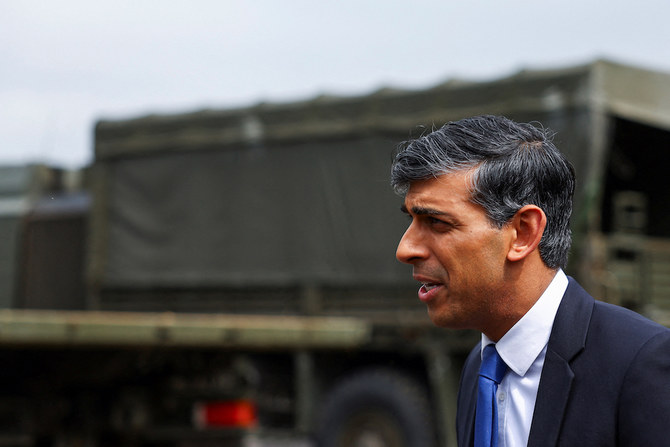
- Documents seen by Sky News reveal London has struck returns agreement with Baghdad
- They also suggest a desire to improve relations with Iran to return people to the country
LONDON: The UK considered sending asylum-seekers to Iraq for processing, new documents have shown.
Iraq is considered very dangerous, with the UK government advising against all travel to the country.
But a plan similar to the Rwanda scheme to process migrants in a third-party country was floated at one stage by Whitehall officials, with negotiations said to have achieved “good recent progress.”
The UK has struck a returns agreement with Baghdad for Iraqi citizens, which was achieved without a formal announcement or acknowledgement and a plea for “discretion,” the documents, seen by Sky News, suggest.
The cache of papers casts new light on the UK government’s approach to dealing with asylum-seekers and illegal migration, including a desire to improve relations with the Iranian Embassy in London in order to ease the repatriation of Iranian citizens, and moves to establish return agreements with Eritrea and Ethiopia.
Biden meets Jordan’s King Abdullah as Gaza ceasefire hopes dim
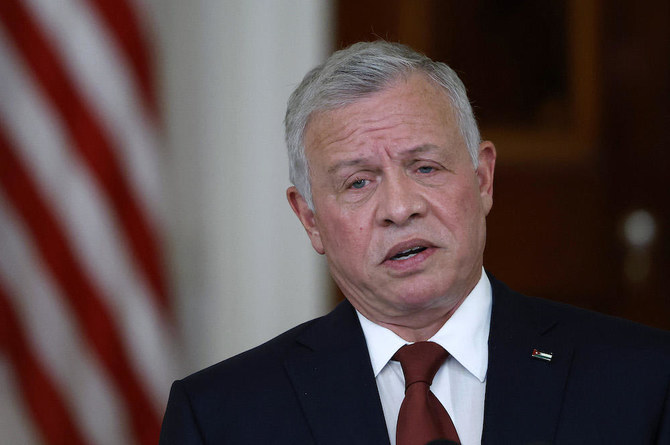
- Monday’s meeting between two leaders is not a formal bilateral meeting but an informal private meeting
- US president Biden faces increasing pressure politically to convince Israel to hold off on an invasion
WASHINGTON: President Joe Biden will meet Middle East ally, Jordan’s King Abdullah II, at the White House on Monday with prospects for a Gaza ceasefire appearing slim and Palestinian Islamist group Hamas and Israeli officials blaming each other for the impasse.
On Sunday, Hamas reiterated its demand for an end to the war in exchange for the freeing of hostages, and Israeli Prime Minister Benjamin Netanyahu flatly ruled that out. Hamas also attacked the Kerem Shalom crossing into Gaza that Israel said killed three of its soldiers.
A Jordanian diplomat said Monday’s meeting between Biden and King Abdullah is not a formal bilateral meeting but an informal private meeting. It comes as the Biden administration and Israeli officials remain at odds over Israel’s planned military incursion in Rafah.
Biden last met King Abdullah at the White House in February and the two longtime allies discussed a daunting list of challenges, including a looming Israeli ground offensive in southern Gaza and the threat of a humanitarian calamity among Palestinian civilians. Jordan and other Arab states have been highly critical of Israel’s actions and have been demanding a ceasefire since mid-October as civilian casualties began to skyrocket. The war began after Hamas stunned Israel with a cross-border raid on Oct. 7 in which 1,200 people were killed and 252 hostages taken, according to Israeli tallies.
Biden last spoke to Netanyahu on April 28 and “reiterated his clear position” on a possible invasion of the Gaza border city of Rafah, the White House said. The US president has been vocal in his demand that Israel not undertake a ground offensive in Rafah without a plan to protect Palestinian civilians.
With pro-Palestinian protests erupting across US college campuses, Biden faces increasing pressure politically to convince Israel to hold off on an invasion. Biden addressed the campus unrest over the war in Gaza last week but said the campus protests had not forced him to reconsider his policies in the Middle East.
Russia’s president Putin orders nuclear drills with troops near Ukraine
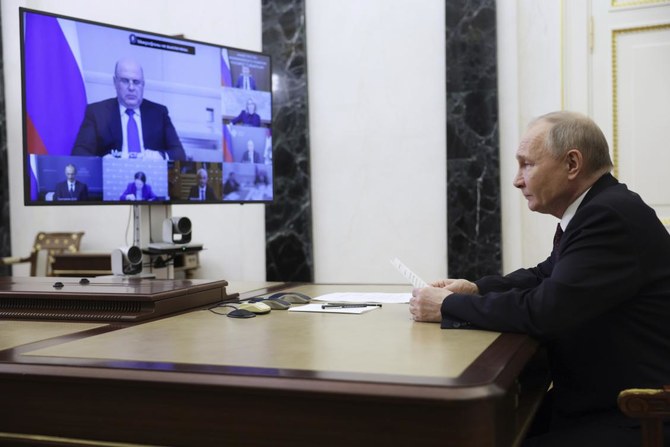
- Putin has upped his nuclear rhetoric since the Ukraine conflict began, warning in his address to the nation in February there was a ‘real’ risk of nuclear war
MOSCOW: President Vladimir Putin has ordered the Russian military to hold nuclear weapons drills involving the navy and troops based near Ukraine, the defense ministry said Monday.
Putin has upped his nuclear rhetoric since the Ukraine conflict began, warning in his address to the nation in February there was a “real” risk of nuclear war.
“During the exercise, a set of measures will be taken to practice the preparation and use of non-strategic nuclear weapons,” the defense ministry said.
Non-strategic nuclear weapons, also known as tactical nuclear weapons, are designed for use on the battlefield and can be delivered via missiles.
The ministry said the exercises would take place “in the near future” and were aimed at ensuring Russia’s territorial integrity in the face of “threats by certain Western officials.”
Aircraft and naval forces will take part, as well as troops from the Southern Military District, which borders Ukraine and includes the occupied Ukrainian territories, it said.
Western officials have become increasingly alarmed by the Kremlin’s nuclear rhetoric during the offensive in Ukraine, with Putin frequently invoking Russia’s nuclear doctrine.
Last year Russia ditched its ratification of the Comprehensive Nuclear Test Ban Treaty and pulled out of a key arms reduction agreement with the United States.
No place to pray for Muslim workers in Italian city

- Urban planning regulations tightly limit the establishment of places of worship, mayor says
- Islam is not among the 13 religions that have official status under Italian law
MONFALCONE, Italy: It’s Friday prayers in the northeastern Italian city of Monfalcone, and hundreds of men are on their knees in a concrete parking lot, their heads bowed to the ground.
They are just a fraction of the city’s Muslims who since November have been banned from praying inside their two cultural centers by Monfalcone’s far-right mayor.
Instead, they assemble in this privately owned construction site as they await a court decision later this month to settle a zoning issue they say has barred their constitutional right to prayer.
Among them is Rejaul Haq, the property’s owner, who expresses frustration over what he and many other Muslims see as harassment by the city they call home.
“Tell me where I should go? Why do I have to go outside of Monfalcone? I live here, I pay taxes here!” lamented Haq, a naturalized Italian citizen who arrived from Bangladesh in 2006.
“Catholics, Orthodox, Protestants, Jehovah’s, if they all have their church — why can’t we have one?”
Immigrants make up a third of this city of 30,000 inhabitants outside Trieste, most of them Bangladeshi Muslims who began arriving in the late 1990s to build cruise-liners for ship builder Fincantieri, whose Monfalcone shipyard is Italy’s largest.
Their presence is immediately visible, whether the Bangladeshi men on bicycles peddling to and from work or the ethnic grocery stores on street corners.
For Mayor Anna Cisint, the restriction on prayer is about zoning, not discrimination.
Urban planning regulations tightly limit the establishment of places of worship, and as a mayor in a secular state, she says it is not her job to provide them.
“As a mayor, I’m not against anybody, I wouldn’t even waste my time being against anybody, you see, but I’m also here to enforce the law,” Cisint said.
Still, she argues the number of Muslim immigrants, boosted by family reunifications and new births, has become “too many for Monfalcone.”
“There are too many... you have to tell it like it is,” she said.
Her warnings about the “social unsustainability” of Monfalcone’s Muslim population have propelled Cisint to national headlines in recent months.
They have also assured her a spot in upcoming European Parliament elections for Matteo Salvini’s anti-immigrant League party, part of Prime Minister Giorgia Meloni’s coalition government.
The League for decades has obstructed mosque openings in its stronghold of northern Italy. But the problem is nationwide in Catholic-majority Italy.
Islam is not among the 13 religions that have official status under Italian law, which complicates efforts to build places of worship.
There are currently fewer than 10 officially recognized mosques, said Yahya Zanolo of the Italian Islamic Religious Community (COREIS), one of the country’s main Muslim associations.
That means that out of Italy’s estimated more than two million Muslims, most are relegated to thousands of makeshift places of worship that “feed prejudice and fear in the non-Muslim population,” said Zanolo.
Cisint, who has been under police protection since receiving online death threats in December, complains about a resistance to integration by what she called a “very closed” community.
She asks why Arabic and not Italian is taught in the community centers and calls “intolerable” wives walking behind husbands or schoolgirls in veils.
In the run-up to European elections, the League has once again seized on illegal immigration to Italy — where nearly 160,000 migrants arrived by boat last year, mostly from Muslim countries — as a vote-winner.
Salvini has called the June vote “a referendum on the future of Europe,” to decide “whether Europe will still exist or whether it will be a Sino-Islamic colony.”
But Monfalcone’s Muslims don’t fit the stereotypes exploited by the League, armed as they are with work permits or passports.
“It’s not like we came here to see the beautiful city of Monfalcone,” jokes Haq. “It’s because there’s work here.”
Many Muslims said they feel a palpable sense of distrust, if not outright hatred, from some of the long-time residents.
Ahmed Raju, 38, who works at Fincantieri installing panels, has mostly prayed at home since the cultural centers have been off-limits.
Such is the reach of the mayor’s rhetoric that “even I get scared” about Muslims, Raju said.
Of the prejudice the community faces, Raju added: “You feel like you’re in front of a big wall, that you can’t break down.”
“We’re foreigners. We can’t change the situation.”
Outside a classroom where volunteers teach Italian to recently immigrated women, Sharmin Islam, 32, said the animosity is acutely felt by her young son who was born in Italy.
“He comes back from school and asks, ‘Mum, are we Muslims bad?’”
An administrative court in Trieste will rule on May 23 whether to uphold or strike down the mayor’s ban on prayer within the cultural centers.
Haq says Monfalcone’s Muslims have “no Plan B” if they lose, but worries even if they win the scars from the stand-off will remain.
Meanwhile Cisint has been actively promoting her book, “Enough Already: Immigration, Islamization, Submission,” warning Monfalcone’s situation could be duplicated elsewhere.
On a recent public holiday, Bangladeshis filled the city’s main square, from little girls with unicorn balloons to groups of young men enjoying a day off.
Looking on was barman Gennaro Pomatico, 24.
“The locals won’t ever accept them,” said Pomatico.
“But ultimately they don’t bother anyone.”
Philippines, US fire at ‘invasion’ force in South China Sea war games
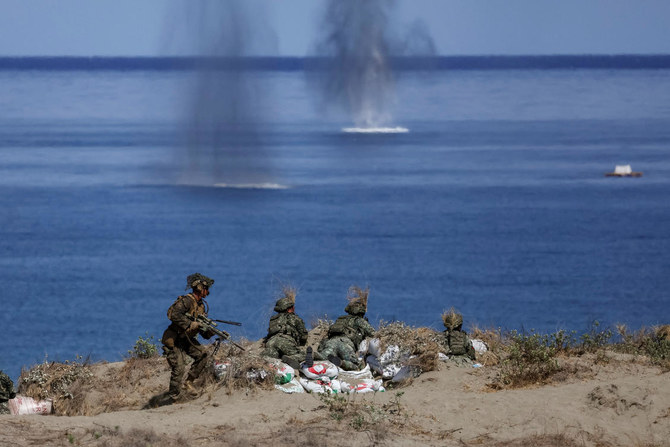
- Thousands of troops are conducting maneuvers against a backdrop of increased confrontations between Chinese and Filipino vessels around shoals in the South China Sea
LAOAG, Philippines: US and Filipino troops fired missiles and artillery at an imaginary “invasion” force during war games on the Philippines’ northern coast Monday, days after their governments objected to China’s “dangerous” actions in regional waters.
Thousands of troops are conducting land, sea and air maneuvers against a backdrop of increased confrontations between Chinese and Filipino vessels around shoals in the South China Sea claimed by Manila, as well as stepped-up Chinese air and naval activity around nearby self-ruled Taiwan.
US troops massed at a strip of sand dunes on Luzon island’s northwest coast — around 400 kilometers south of Taiwan — let loose more than 50 live 155mm howitzer rounds at floating targets about five kilometers off the coast, AFP journalists saw.
Filipino troops followed up by firing rockets aimed at wearing down the attackers, before the two forces finished the job with machine guns, Javelin missiles and more artillery rounds.
Lt. Gen. Michael Cederholm, commander of the US First Marine Expeditionary Force, said the exercise was “to prepare for the worst” by “securing key maritime terrain.”
“It’s designed to repel an invasion,” Cederholm told reporters at the exercise site.
“Our northwestern side is more exposed,” Major General Marvin Licudine, exercise director for the Filipinos, said ahead of the live firing at the La Paz sand dunes near Laoag city.
“Because of the regional problems that we have... we have to already practice and orient ourselves in our own land in these parts,” he added.
Beijing claims almost the entire South China Sea despite an international ruling that its assertion has no legal basis.
It deploys hundreds of coast guard, navy and other vessels to patrol and militarise the waters.
Just last week, Manila said the China Coast Guard damaged a Philippine Coast Guard ship and another government vessel in water cannon attacks around the disputed China-controlled Scarborough Shoal in the South China Sea on April 30.
More than 16,700 Filipino and American troops are taking part in the annual military drills — dubbed Balikatan, or “shoulder to shoulder” in Tagalog — in multiple locations across the Asian archipelago.
Maritime confrontations between China and the Philippines have raised fears of a wider conflict that could involve the United States and other allies.
Monday’s exercise came days after the defense ministers of the Philippines, the United States, Japan and Australia met in Hawaii and issued a joint statement on their strong objections to the “dangerous and destabilising conduct” of China in the South China Sea.
The ministers “discussed opportunities to further advance defense cooperation” and to “work together to support states exercising their rights and freedoms in the South China Sea.”
Last week, US forces taking part in the Balikatan exercises fired HIMARS precision rockets into the South China Sea from the western island of Palawan, the nearest major Philippine landmass to the hotly disputed Spratly Islands.
The US Marine Corps said the maneuver was a rehearsal for the rapid deployment of the missile system across the Philippines’ South China Sea coast to “secure and protect Philippines’ maritime terrain, territorial waters and exclusive economic zone interests.”
The confrontations between the Philippines and China comes as tensions have ratcheted up between Beijing and Taipei, which is about to inaugurate a new president regarded by China as a dangerous separatist.
Taiwan’s defense ministry said Friday it had detected 26 Chinese aircraft and five naval vessels around the self-ruled island in the previous 24 hours.
“To a degree, military exercises are a form of deterrence,” Philippine Foreign Secretary Enrique Manalo was quoted as saying in remarks delivered on his behalf by an aide at a public workshop on Friday.
“The more we simulate, the less we actuate,” he added.



